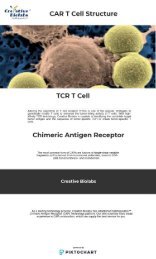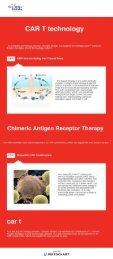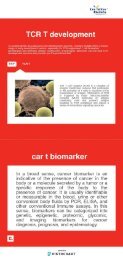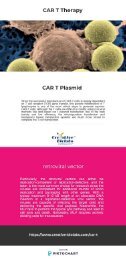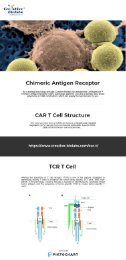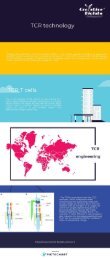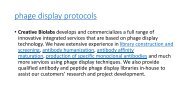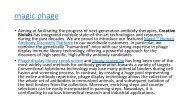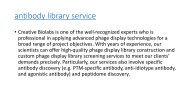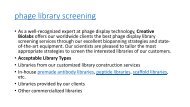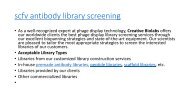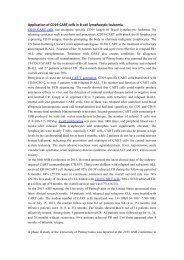Analysis of CD19 CAR-T Cell Therapy Clinical Trials
In the transduction of CARs molecular gene sequences, CAR-T, which is currently used clinically, is mainly used for transfection of CAR T gene by retroviruses. The methods of gamma retrovirus and lentivirus are used on average. Due to the confounding effects, there is currently no clear data indicating which transfection distribution is more advantageous. Currently, 4-1BB transfection uses a lentivirus in the clinic, and a gamma retrovirus in CD28. In addition, considering the economic factors and ease of use, the non-viral transfection process has also received widespread attention. Some transduction strategies such as mRNA transposon-transposon enzyme are also underway, but there is still a lack of sufficient In vitro study data.
In the transduction of CARs molecular gene sequences, CAR-T, which is currently used clinically, is mainly used for transfection of CAR T gene by retroviruses. The methods of gamma retrovirus and lentivirus are used on average. Due to the confounding effects, there is currently no clear data indicating which transfection distribution is more advantageous. Currently, 4-1BB transfection uses a lentivirus in the clinic, and a gamma retrovirus in CD28. In addition, considering the economic factors and ease of use, the non-viral transfection process has also received widespread attention. Some transduction strategies such as mRNA transposon-transposon enzyme are also underway, but there is still a lack of sufficient In vitro study data.
You also want an ePaper? Increase the reach of your titles
YUMPU automatically turns print PDFs into web optimized ePapers that Google loves.
<strong>Analysis</strong> <strong>of</strong> <strong>CD19</strong> <strong>CAR</strong>-T <strong>Cell</strong> <strong>Therapy</strong> <strong>Clinical</strong> <strong>Trials</strong><br />
In the transduction <strong>of</strong> <strong>CAR</strong>s molecular gene sequences, <strong>CAR</strong>-T, which is currently used clinically, is mainly used for<br />
transfection <strong>of</strong> <strong>CAR</strong> T gene by retroviruses. The methods <strong>of</strong> gamma retrovirus and lentivirus are used on average. Due to the<br />
confounding effects, there is currently no clear data indicating which transfection distribution is more advantageous. Currently,<br />
4-1BB transfection uses a lentivirus in the clinic, and a gamma retrovirus in CD28. In addition, considering the economic<br />
factors and ease <strong>of</strong> use, the non-viral transfection process has also received widespread attention. Some transduction<br />
strategies such as mRNA transposon-transposon enzyme are also underway, but there is still a lack <strong>of</strong> sufficient In vitro study<br />
data.<br />
One <strong>of</strong> the difficulties in the optimization <strong>of</strong> the <strong>CD19</strong> <strong>CAR</strong>-T clinical trial is the lack <strong>of</strong> homogeneity <strong>of</strong> the imported <strong>CAR</strong>-T<br />
cells. The results <strong>of</strong> the xenogeneic model suggest that different T cell subsets in <strong>CAR</strong>-T cells have distinct effects on B-cell<br />
lymphoma. Therefore, The initial T cell species before T cell transformation has an important influence on the therapeutic<br />
effect <strong>of</strong> T cells, which is particularly important for patients with T cell subpopulations that constitute a highly diverse group <strong>of</strong><br />
B cell malignancies. Researchers at the Fred Hutchinson Cancer Research Center (FHCRC) returned to the patient by<br />
separating CD4+ and CD8+ T cells from T cells and then composing the final therapeutic <strong>CAR</strong>-T cells in a certain proportion,<br />
although the process was more complicated but improved. The homogeneity <strong>of</strong> the input cells simultaneously enhances the<br />
predictability <strong>of</strong> the dose and toxicity <strong>of</strong> imported <strong>CAR</strong>-T cells and the CRS response in the eye between biomarkers.<br />
Patients with B-ALL were treated by using <strong>CAR</strong>-T cells containing CD4-positive T cells together with central memory CD8-positive T<br />
cells or host CD8-positive T cells. The test results showed that these two types <strong>of</strong> <strong>CAR</strong>-T cells were almost complete remissio in the<br />
treated patients, and a similar high rate <strong>of</strong> complete remission also occurred in the <strong>CAR</strong>-T treatment group containing the host T cells<br />
and CD4-positive T cells. In the clinical trial <strong>of</strong> <strong>CAR</strong>-T treatment after autologous peripheral blood stem cell transplantation in patients<br />
with non-Hodgkin's lymphoma, the two groups <strong>of</strong> different therapeutic <strong>CAR</strong>-T cells were composed <strong>of</strong> central memory CD8-positive T<br />
cells and large central Memory CD8 positive T cells. Due to the small number <strong>of</strong> trials, it is not possible to compare the differences<br />
between the two treatment groups. More tests are required in the fashion to demonstrate whether <strong>CAR</strong>-T cells formed by different T<br />
cell subtype ratios affect the survival time <strong>of</strong> <strong>CAR</strong>-T cells or reduce the recurrence rate.<br />
A major challenge in cell delivery in <strong>CAR</strong>-T cell therapy is the production <strong>of</strong> sufficient <strong>CAR</strong>-T cells from patients who have<br />
undergone lymphopenia after chemotherapy treatment. Researchers at FHCRC have found that stimulation <strong>of</strong> <strong>CAR</strong>transformed<br />
T cells with <strong>CD19</strong>-bearing antigen-presenting cells alone can maintain the proliferation <strong>of</strong> <strong>CAR</strong>-T cells in vitro.<br />
This finding can ensure that patients with severe lymphopenia can enter clinical trials. <strong>CAR</strong>-T cells produced by allogeneic<br />
donors can also be applied to patients with severe lymphocytopenia, although allogeneic peripheral blood stem cell<br />
transplantation is clinically applied as a feasible solution to patients, however, heterologous <strong>CAR</strong>-T cell transplantation is not<br />
applicable. The role <strong>of</strong> transplant patients is not clear.<br />
Preclinical studies have shown that limiting the differentiation <strong>of</strong> <strong>CAR</strong>-T cells during in vitro culture can improve their clinical<br />
outcome after international reinfusion. Limiting cell differentiation may be achieved by, for example, supplementing different<br />
cytokines (using IL-7 and IL-15 instead <strong>of</strong> IL-2) or altering the signaling pathway <strong>of</strong> the culture process. There are different<br />
production methods for different clinical <strong>CAR</strong>-T products, such as stimulation <strong>of</strong> polyclonal T cells before reinfusion,<br />
concentration <strong>of</strong> IL-2 during culture, or in vitro antigen stimulation to enable the input <strong>of</strong> <strong>CAR</strong>-T cells to patients. Different<br />
differentiation states thus affect the therapeutic effect. However, specific clinical data related to the above factors do not yet<br />
have more open information.<br />
Finally, the choice <strong>of</strong> pre-treatment patient lymphocyte depletion strategy also affects the expansion and survival <strong>of</strong> <strong>CAR</strong>-T<br />
cells in patients. This is mainly due to the widespread use <strong>of</strong> IL-7 and IL-15 in <strong>CAR</strong>-T cell culture before reinfusion. A clinical
study showed that patients with B-ALL who received both cyclophosphamide and fludarabine for T-cell clearance had better T<br />
cell proliferation and survival than patients who received cyclophosphamide only. This may be caused by the fact that CD8-<br />
positive T cells immunoreact with antigenic epitopes present in the mouse single-chain variable region, and that the same<br />
immune response is also triggered by CD4-positive T cells. All current <strong>CD19</strong> <strong>CAR</strong>s include the <strong>CAR</strong> T scFv and fusion sites<br />
that are immunogenic in humans. Therefore, comparison <strong>of</strong> the maintenance <strong>of</strong> <strong>CAR</strong>-T cells in different clinical trials must first<br />
consider the lymphocyte clearance protocol. Although the addition <strong>of</strong> fludarabine increases the in vivo expansion and<br />
maintenance <strong>of</strong> <strong>CAR</strong>-T cells, the degree <strong>of</strong> lymphocyte depletion optimization and the importance <strong>of</strong> lymphocyte depletion are<br />
different in different patients. For patients at risk <strong>of</strong> an anti-<strong>CAR</strong> immune response, a more aggressive clearance <strong>of</strong><br />
lymphocytes is required, and for other patients, such as patients who have undergone myelosuppression prior to undergoing<br />
autologous peripheral blood stem cell transplantation, due to the elimination <strong>of</strong> available antigens in vivo. Instead, it will impair<br />
the role <strong>of</strong> <strong>CAR</strong>-T cells.<br />
At present, the successful clinical application <strong>of</strong> <strong>CD19</strong> <strong>CAR</strong>-T cells is based on numerous preclinical and clinical studies.<br />
Although the differences in <strong>CAR</strong> T design development, production strategies, and clinical delivery make it difficult to compare<br />
the results <strong>of</strong> different clinical trials, we have begun to look for some key models to guide the optimization <strong>of</strong> future <strong>CAR</strong>-T cell<br />
immunotherapy protocols.<br />
Author Bio<br />
As a global company, Creative Biolabs has more than 200 talented and well-trained scientists located in different continents<br />
working closely with partners from the entire world to develop and produce medicines <strong>of</strong> tomorrow. Specifically, we are the<br />
established leading expert in TCR and <strong>CAR</strong> T&NK cell immune therapy development, as we <strong>of</strong>fer the one-stop custom<br />
services that cover the entire new drug development pipeline. Additionally, we also <strong>of</strong>fer an exclusive line <strong>of</strong> ready-to-use TCR<br />
and <strong>CAR</strong> T&NK cell construction products, such as in vivo animal testing, virus packaging, purification, expansion and titer<br />
determination kits. Furthermore, we have built up a unique unparalleled <strong>CAR</strong> construction and production platform for all four<br />
<strong>CAR</strong> generations.




